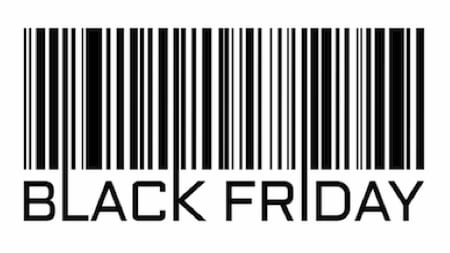All you need to know about Black Friday

For many shoppers, Black Friday and Cyber Monday mark the start of the Christmas shopping period as retailers slash prices in a bid to boost sales. But a mix of heavy discounting and an influx of customers is not always a good thing…
Jermaine HaughtonSet to generate at least £1billion for British retailers, the American discount shopping day has proven to be very popular in the UK since its arrival five years ago. Notable for its long queues of shoppers and double-digit price cuts on luxury items, Black Friday sales have grown from strength-to-strength each year.
For many consumers, Black Friday (and its sister shopping day Cyber Monday) has become a pivotal point in the year marking the start of Christmas shopping. Bricks-and-mortar retailers experience a welcome spike in business on the day, which is set to increase this week with analysts Springboard predicting that footfall on Black Friday will be 11.5% higher than last year. Researchers believe this rise will be driven by a 17% boost in visits to retail parks.
Online shopping will also continue to drive sales. The Centre for Retail Research estimates online spending on Black Friday to be closer to £966m, with total Black Friday sales reaching £1.39bn and shopping over the entire weekend nearing £3.5bn.
However, the day comes with its negatives – from fights among customers to “abused” and overworked staff. And ultimately, Black Friday is not yet a “be all and end all” event in the UK for retailers.
One survey found that 70% of Britons were not planning on making a purchase on either Black Friday or Cyber Monday and 89% of consumers said that they would not think badly of retailers who didn’t participate with the sales.
Predicting that launching major discounts on its stock on Black Friday would be detrimental to its overall Christmas sales, Asda has opted against participating in the whole 24-hour frenzy this year. Conversely, Amazon, Carphone Warehouse and other major chains decided to spread their flash sales over a number of days, starting on Monday, to snare shoppers' cash before the big day. Early discounts has already led to Argos’ website to crash by excited shoppers.
Nevertheless, many small-and medium-sized businesses across the country are frantically trying to prepare themselves to cash-in on the £12,384 expected to be spent every second online by eager bargain-hunters.
Here are four crucial considerations retail managers need to make before they can capitalise on Black Friday:
Anticipate the physical demands
The unflattering sight of shoppers trampling over each other to pick up a discounted flat-screen TV were broadcast on news outlets during last year’s event, and has prompted the National Police Chiefs’ Council to issue a warning to retailers to provide enough staff and security to ensure fallouts and fights are handled competently.
The demand for goods will also require extra staff to answer questions, process sales and handle all other customer queries. Managers could consider hiring temporary staff for the period and incentivise permanent customer service staff to take on more shifts.
Test, test and test your e-commerce systems
With 48% of SMEs struggling to deal effectively with the increased website traffic last Black Friday, according to a Royal Mail study, retail chiefs are well-advised to ensure that their website and mobile app are fully optimised to handle the high level of virtual footfall. Get an IT professional to test your servers looking for any bugs that might interrupt the user experience, as well as practice making purchases on your company’s site using a number of different devices, from smartphone to desktops to tablets.
“Black Friday 2014 was bigger than any UK retailer could have anticipated and while they forecasted a spike on the peak trading day, many back-end systems weren’t ready to cope with this new phenomenon,” Glen Burson, chief technology officer at global strategists Salmon, explained. “This caused websites to crash, orders to be lost and other similar issues. Retailers need to address their online operations as a priority in a bid to avoid site outages, slow browsing and queuing; anything which could damage the customer experience and results in lost sales.”
Don’t overstretch your business
With major retailers making discounts of up to 50% on some products, SME bosses are likely to feel the pressure to compete with similar price cuts. But retailers need to make sure price cuts are in line with what the company can afford, making sure to consider budgets and sales targets.
While 50% price cuts may be unachievable, 20-30% reductions are still substantial enough savings to attract customers, especially if it is accompanied by great customer service.
Alan Watson, managing director of retail IT support specialists Barron McCann, said: “While there is the temptation to slash prices across a range of items to ensure you target a wider customer demographic, it may be more practical to consider a limited range of products, so that you are still participating but it’s unlikely to impact too many of your product lines and promotions.”
Don’t forget loyal customers
Retailers should not sacrifice the integrity and credibility of their existing schemes in order to appeal to Black Friday shoppers. Research on Black Friday suggests the event tends to attract opportunist bargain hunters rather than long-term customers, with 70% of consumers saying they would not sign up for membership or loyalty cards.
Therefore, companies must keep existing customers engaged throughout the year with regular communications, special incentives and rewards for Black Friday, in conjunction with promoting bargains to attract new customers.
Black Friday doesn’t just affect retailers. This week, the CMI Insights newsletter will be with you a day early on Thursday to avoid putting too much strain on our IT systems

Press & Media Enquiries
For more information or to request interviews, contact CMI's Press Team on 020 7421 2705 or email press.office@managers.org.uk


